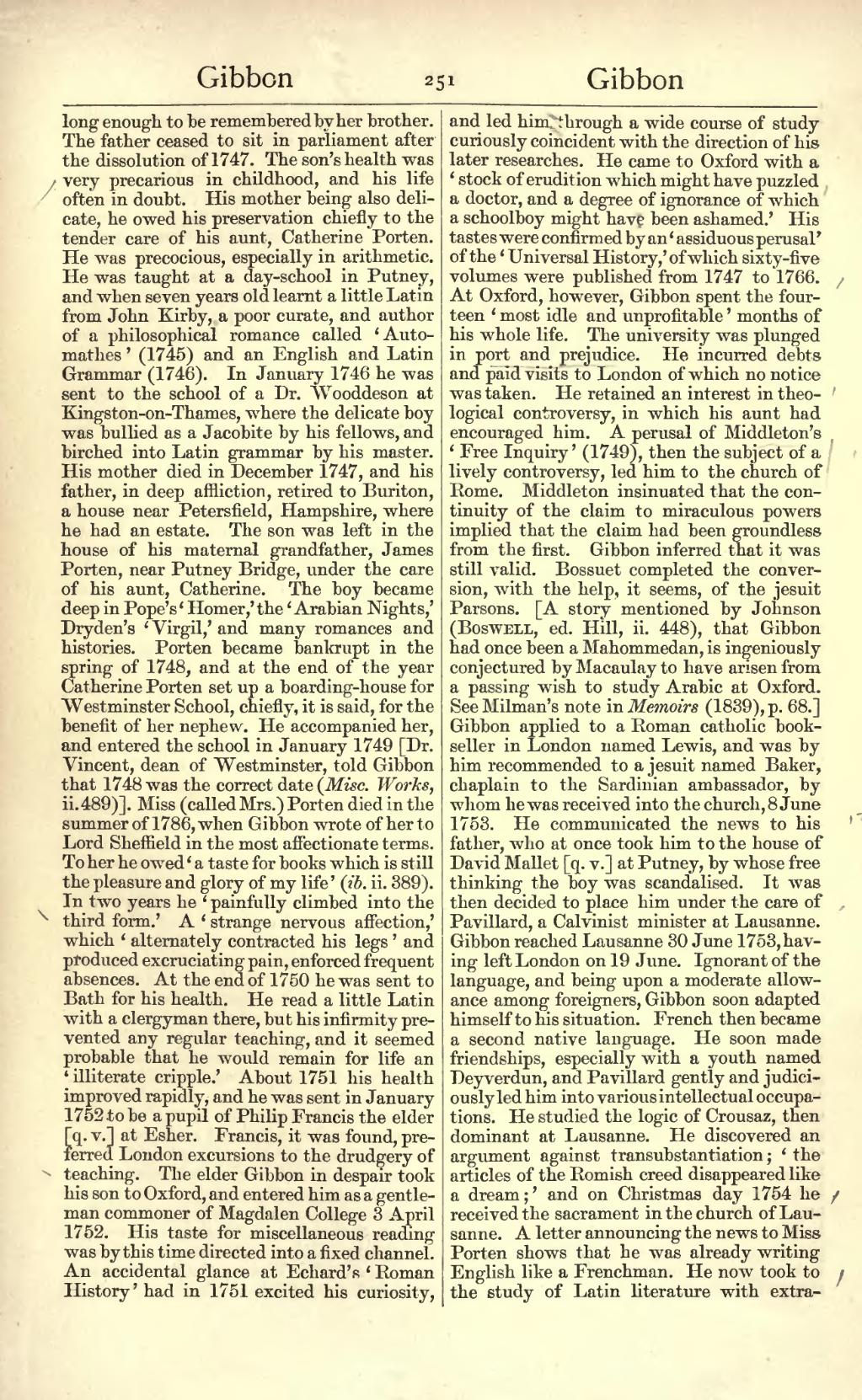long enough to be remembered by her brother. The father ceased to sit in parliament after the dissolution of 1747. The son's health was very precarious in childhood, and his life often in doubt. His mother being also delicate, he owed his preservation chiefly to the tender care of his aunt, Catherine Porten. He was precocious, especially in arithmetic. He was taught at a day-school in Putney, and when seven years old learnt a little Latin from John Kirby, a poor curate, and author of a philosophical romance called ‘Automathes’ (1745) and an English and Latin Grammar (1746). In January 1746 he was sent to the school of a Dr. Wooddeson at Kingston-on-Thames, where the delicate boy was bullied as a Jacobite by his fellows, and birched into Latin grammar by his master. His mother died in December 1747, and his father, in deep affliction, retired to Buriton, a house near Petersfield, Hampshire, where he had an estate. The son was left in the house of his maternal grandfather, James Porten, near Putney Bridge, under the care of his aunt, Catherine. The boy became deep in Pope's ‘Homer,’ the ‘Arabian Nights,’ Dryden's ‘Virgil,’ and many romances and histories. Porten became bankrupt in the spring of 1748, and at the end of the year Catherine Porten set up a boarding-house for Westminster School, chiefly, it is said, for the benefit of her nephew. He accompanied her, and entered the school in January 1749 [Dr. Vincent, dean of Westminster, told Gibbon that 1748 was the correct date (Misc. Works, ii. 489)]. Miss (called Mrs.) Porten died in the summer of 1786, when Gibbon wrote of her to Lord Sheffield in the most affectionate terms. To her he owed ‘a taste for books which is still the pleasure and glory of my life’ (ib. ii. 389). In two years he ‘painfully climbed into the third form.’ A ‘strange nervous affection,’ which ‘alternately contracted his legs’ and produced excruciating pain, enforced frequent absences. At the end of 1750 he was sent to Bath for his health. He read a little Latin with a clergyman there, but his infirmity prevented any regular teaching, and it seemed probable that he would remain for life an ‘illiterate cripple.’ About 1751 his health improved rapidly, and he was sent in January 1752 to be a pupil of Philip Francis the elder [q. v.] at Esher. Francis, it was found, preferred London excursions to the drudgery of teaching. The elder Gibbon in despair took his son to Oxford, and entered him as a gentleman commoner of Magdalen College 3 April 1752. His taste for miscellaneous reading was by this time directed into a fixed channel. An accidental glance at Echard's ‘Roman History’ had in 1751 excited his curiosity, and led him through a wide course of study curiously coincident with the direction of his later researches. He came to Oxford with a ‘stock of erudition which might have puzzled a doctor, and a degree of ignorance of which a schoolboy might have been ashamed.’ His tastes were confirmed by an ‘assiduous perusal’ of the ‘Universal History,’ of which sixty-five volumes were published from 1747 to 1766. At Oxford, however, Gibbon spent the fourteen ‘most idle and unprofitable’ months of his whole life. The university was plunged in port and prejudice. He incurred debts and paid visits to London of which no notice was taken. He retained an interest in theological controversy, in which his aunt had encouraged him. A perusal of Middleton's ‘Free Inquiry’ (1749), then the subject of a lively controversy, led him to the church of Rome. Middleton insinuated that the continuity of the claim to miraculous powers implied that the claim had been groundless from the first. Gibbon inferred that it was still valid. Bossuet completed the conversion, with the help, it seems, of the jesuit Parsons. [A story mentioned by Johnson (Boswell, ed. Hill, ii. 448), that Gibbon had once been a Mahommedan, is ingeniously conjectured by Macaulay to have arisen from a passing wish to study Arabic at Oxford. See Milman's note in Memoirs (1839), p. 68.] Gibbon applied to a Roman catholic bookseller in London named Lewis, and was by him recommended to a jesuit named Baker, chaplain to the Sardinian ambassador, by whom he was received into the church, 8 June 1753. He communicated the news to his father, who at once took him to the house of David Mallet [q. v.] at Putney, by whose free thinking the boy was scandalised. It was then decided to place him under the care of Pavillard, a Calvinist minister at Lausanne. Gibbon reached Lausanne 30 June 1753, having left London on 19 June. Ignorant of the language, and being upon a moderate allowance among foreigners, Gibbon soon adapted himself to his situation. French then became a second native language. He soon made friendships, especially with a youth named Deyverdun, and Pavillard gently and judiciously led him into various intellectual occupations. He studied the logic of Crousaz, then dominant at Lausanne. He discovered an argument against transubstantiation; ‘the articles of the Romish creed disappeared like a dream;’ and on Christmas day 1754 he received the sacrament in the church of Lausanne. A letter announcing the news to Miss Porten shows that he was already writing English like a Frenchman. He now took to the study of Latin literature with extra-
Page:Dictionary of National Biography volume 21.djvu/257
This page has been validated.
Gibbon
251
Gibbon
